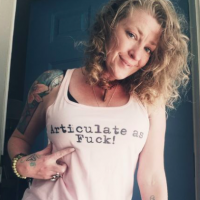“Grief keeps the heart flexible, fluid, and open to others.” ~ Frances Weller
~
We will find ourselves over a lifetime, walking with death, and dying to many things big and small.
There is grief that is stirred when a loved one dies; people seem to somewhat get this type of grief, though even it can be gaslit away by well-meaning people who just want things to go back to normal.
There is no normal when grief moves in. There is the possibility of moving forward—of forever carrying the place inside of us where that loss lives—there’s no going back.
I have a client who, two years ago, lost her mother. They were close; they lived together, worked together, were enmeshed in each other’s daily lives. My client is still grieving. Friends and family tell her frequently to “just focus on the good times.” And that’s just it—in grief, it is the joy that is missed. The absence of this joy we’re asked to remember is the cause of the waves of sadness, anger, or elation that can overtake us at any moment.
My client weeps daily over her mother. In the absence of her physical presence, she has come to also understand her mother’s shortcomings and neuroses, and see how those affected her developmentally. She has come to a place where she not only grieves the absence of her mother, but what her mother was not able to give her. As an adult, she is just now learning about boundaries and healthy relationship dynamics—things her mother did not have the skills to model.
She grieves. She heals. She grows.
We need to learn to grieve and grieve well. For in the absence of our ability to grieve, neuroses flourish. It takes tremendous effort to bury our pain. When covered up, that energy gets twisted and distorted and becomes neurotic. But this very same energy can be liberated for healing and creativity. We need only feel to heal.
But wait! Grief is not exclusively for widows and widowers, for people who have lost a parent or—God forbid—a child. Grief is for wounded warriors, woken by battle nightmares. Grief is for phantom limbs, and itches that cannot be scratched, for the places inside where winter winds howl incessantly, even on the brightest summer days.
No! Grief is for everybody. It is for everywhere, and all the time.
This is the problem: we have relegated grief to funeral homes, coffins, and Hallmark condolence cards that attempt to politely apply comforting words to weeping wounds of absence.
But absence takes on many forms. There is grief that hails from divorce or separation. People seem to have limited patience and compassion for this type of grief. However, it is not uncommon for well meaning phrases like, “You’re better off without” to creep into conversations sooner than is beneficial to a person in the grip of loss.
When I ended my own 10-year relationship, I knew we would be healthier outside of the dynamic we had created together. But it still hurt like hell. After I had finally gotten all my stuff packed up from the home we had shared, I woke early one morning in panic. Momentarily not knowing where I was, I dug his flannel out of my bag and clutched it as I howled over my coffee cup, spattering my leather-bound journal pages with fresh tears.
It hurt. Correction: I hurt. In my bones I hurt.
The process of alchemizing love through release, pain, anger, disappointment, and back to love again is brutal. I found myself not only grieving for what I missed in our relationship—sharing meals, rubbing each other’s feet as we watched Netflix, walking the dog to the pub, being an intricate part of someone’s life—I missed myself. I missed the parts of me I had shut down that had not been welcome in our agreements. Agreements like, don’t be too loud during sex, and don’t talk about things that feel awkward, had led me to shut down parts of my soul—parts that woke in pain and needed grieving.
Grief is awkward. It stirs the thin veil around our own mortality. It makes us uncomfortable. Yet, if we want to grow, want to heal, want to become more humane, compassionate, and skillful, we need to talk about grief.
Grieving what we’ve never known or had is hard and awkward to lean into, let alone talk about. We have a hard enough time, in society, simply talking about or holding space for people who have experienced grief from death or the “death” of a relationship. When it comes to relating grief to things that were never part of our experience, we get utterly befuddled.
I have a client who thought that he had a great childhood. When we began investigating, it turned out there was no physical affection in his family; basic needs were met, but hugs, or even conversations, were rarely exchanged. His family ate their meals separately, or while watching TV. While there was no abuse in the household, there was walking on eggshells around his mother’s moodiness. He never learned to bond. What brought him into my practice was marital problems—inability to engage intimately. Is it a wonder?
He had no reference—somatically or emotionally—for what bonding feels like, so he had no idea how to do it. What did he feel when he discovered this? Deep sadness. He needed space to meet this in himself if he wanted to open with another person. He needed to grieve for what he never received, to know the pain previously unfelt. He needed to feel to heal.
These are just a few examples of the many little deaths that we grieve—sometimes without even knowing it.
Let us turn our attention from incessant comfort-seeking to the raw discomfort of our souls, remembering we are deeply feeling beings. In our care, as well as our grief, there is power.
Let us sit down and learn to be with our own grief, to learn to hold a genuinely compassionate space for the hard, human, and holy. How do we begin? Take one breath then another. Stay with the feeling; let it run its course. Dance, write, paint, or wail it out.
But please, do not shut down.


 Share on bsky
Share on bsky





Read 18 comments and reply